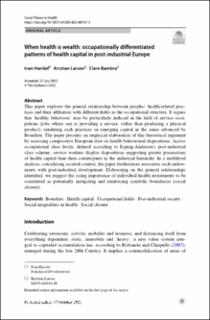When health is wealth: occupationally differentiated patterns of health capital in post‑industrial Europe
Peer reviewed, Journal article
Published version
Permanent lenke
https://hdl.handle.net/11250/3038738Utgivelsesdato
2022-10-07Metadata
Vis full innførselSamlinger
- Publikasjoner fra Cristin [3269]
- SAM - Institutt for sosialfag [471]
Originalversjon
https://doi.org/10.1057/s41285-022-00187-3Sammendrag
This paper explores the general relationship between peoples’ health-related practices and their affiliation with different fields in the occupational structure. It argues that ‘healthy behaviour’ may be particularly induced in the field of service occupations (jobs where one is providing a service, rather than producing a physical product), rendering such practices an emerging capital in the sense advanced by Bourdieu. The paper presents an empirical elaboration of this theoretical argument by assessing comparative European data on health behavioural dispositions. Across occupational class levels, defined according to Esping-Andersen’s post-industrial class scheme, service workers display dispositions suggesting greater possessions of health capital than their counterparts in the industrial hierarchy. In a multilevel analysis, considering societal context, the paper furthermore associates such endowments with post-industrial development. Elaborating on the general relationships identified, we suggest the rising importance of individual health investments to be considered as potentially instigating and reinforcing symbolic boundaries (social closure).

